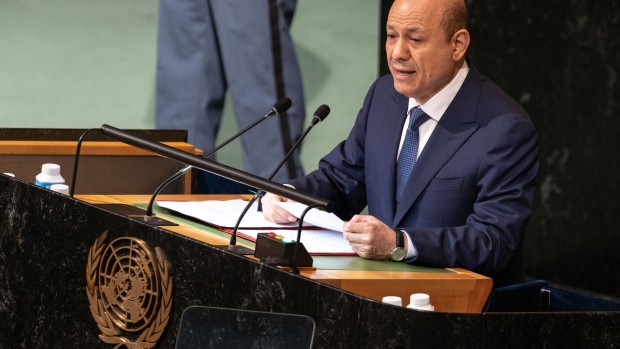Sep 13, 2023
Saudi-UAE Rift Threatens US Effort to End Yemen War
, Bloomberg News

(Bloomberg) -- A deepening rift over the fate of Yemen is endangering peace prospects with risks for the oil-rich Gulf powers that are at the heart of it.
After joining forces to fight the Iranian-backed Houthi group that looked set to overrun Yemen in 2015, Saudi Arabia and the United Arab Emirates are backing rival groups vying for control of a country that sits at the crossroads of vital shipping lanes and on the edge of a major energy-exporting region.
Now, divisions over what a post-war Yemen should look like imperil a fragile truce with the Houthis and threaten to escalate into a fresh round of bloodletting between proxy groups supported by the UAE on one side and Saudi Arabia on the other, said four people directly involved in events on the ground. Recent clashes between Houthi fighters and forces backed by the UAE have already left nearly two dozen dead.
Tensions have bubbled between the two Gulf Arab powers on and off the Yemeni battlefield for years. But growing calls by UAE-backed Yemeni separatists for a break-off state in the south have infuriated Riyadh, which wants Yemen to remain intact. The Biden administration is alarmed by the row and fears it will strengthen Iran and scuttle a key foreign policy goal: Ending the eight-year war that has claimed almost 400,000 lives and become a political liability for the US, said a senior Western official who communicates directly with the conflict’s main local, regional and international players."Yemen is becoming an arena for Saudi Arabia and the UAE to compete and settle their scores through local proxies, diminishing chances for a political compromise," said Ahmed Nagi, senior Yemen analyst at the International Crisis GroupA UAE government official said Abu Dhabi fully supports Saudi efforts to end the war and reach a political settlement under the auspices of the United Nations, and called allegations of tensions between the neighbors “categorically false.”
Critical WeeksThe coming weeks are critical as Saudi Arabia prepares for a new round of talks with Houthi leaders, who threatened Sunday to resume their attacks on the kingdom, including the Neom megaproject, unless their demands for reparations and a large share of oil and gas revenues are met.
That comes as disagreements with the UAE rumble over other issues. Saudi Arabia’s Crown Prince Mohammed bin Salman has increasingly positioned his country as the uncontested regional leader in everything from business, to energy to foreign policy. That’s led to bickering between the traditional allies at OPEC and frustration over a bid to supplant Dubai as the Middle East’s business hub, as well as differences over how to handle common rival Iran.
In May, the head of a group backed by the UAE angered Saudi Arabia when he rode through Yemen’s southern port city of Al-Mukalla and cast himself as leader of a future southern state.
Decked out in sunglasses and a dapper suit, Aidarous Al-Zubaidi looked more like a president-in-waiting than a scrappy rebel as he rode through the streets, waving from the open turret of a military Humvee and trailed by armored vehicles and shiny SUVs. Crowds chanted in support of an independent state — and in gratitude to their well-heeled backers in the UAE.
Saudi Arabia’s defense minister, Prince Khalid bin Salman, the brother of the kingdom’s de facto ruler and his point man for Yemen, was incensed by the spectacle that appeared to openly challenge his country’s fraught efforts to end the disastrous war next door, according to three people with direct knowledge of the situation. A Saudi Defense Ministry official deferred all comment to the government's Center for International Communication, which did not respond to emailed questions.
US Special Envoy for Yemen Tim Lenderking held talks in Abu Dhabi and Riyadh last week aimed at ensuring tensions between the Gulf powers — and the factions they back — don’t undermine efforts to end the conflict, according to two Yemeni officials who met with him. His office declined to comment. Saudi government officials did not respond to written questions and multiple follow up calls. A US official, who didn't want to be named because of the delicate discussions underway, said Washington was working through "existing channels" toward "de-escalation and a durable resolution to the conflict."
Unhappy MarriagePoor, divided and pummeled by decades of successive conflicts, Yemen has emerged as key point of friction for Saudi Arabia’s crown prince and UAE President Sheikh Mohammed bin Zayed, as once-warm ties give way to mistrust and competition for economic and political leadership of the Middle East.
Saudi Arabia resumed diplomatic ties with Iran earlier this year and launched direct talks with the Houthis after years of airstrikes and an economic blockade failed to dislodge them from the Yemeni capital Sanaa.
To that end, it set up last year a new Yemeni Presidential Leadership Council under Rashad Al-Alimi, a Saudi loyalist trusted by the US, aimed at reconciling the warring factions and stabilizing a border state it sees as key to its national security.
While the UAE has publicly supported the council, it’s less enthusiastic about accommodating the Houthis and keen on an independent southern state to maintain the influence it has built over a stretch of coast running from Al-Mukalla to Bab Al-Mandeb, a Red Sea gateway that’s critical to enhancing its status in international trade.
“Some people like to collect stamps and coins,” said Farea Al-Muslimi, a Yemen expert and research fellow at London’s Chatham House think tank. “The UAE loves to collect ports.”
It sees its interests best served by the secessionist Southern Transitional Council led by Zubaidi, a former army officer in his 60s who nominally serves as Alimi’s deputy.
Fighters loyal to Zubaidi have clashed with Saudi-backed government forces in the past, notably over control of the strategic port city of Aden. A 2019 agreement to end the infighting failed to address the underlying differences, which are threatening to explode into violence once again.
Chatham House’s Al-Muslimi compared the Yemeni presidential council to “an unhappy arranged marriage.”
Hadramout ShowdownThat long-running feud entered a dangerous new phase with Zubaidi’s visit to Al-Mukalla as UAE-backed forces trumpeted plans to extend their reach, laying claim to the entirety of Hadramout, Yemen’s largest province and home to 80% of its oil.
The following month, Zubaidi popped up in the genteel halls of London’s Chatham House, where he told an audience of diplomats and experts he’d fight for the province “no matter the cost.”
Around the same time, a Saudi Air Force plane landed in Hadramout’s main airport to transport local leaders, including the governor, to Riyadh where they announced the formation of a new regional committee to confront the secessionists. It’s a model the Saudis plan to repeat across the south to block any bid for independence.
The ancestral home of some of Saudi Arabia’s most prominent business and banking families, Hadramout shares a long and porous frontier with Saudi Arabia. The region is viewed by Riyadh as integral to its security and the prospect of a UAE-controlled rump state on its border has not been received well, said a senior adviser to the Saudi government.
To bolster its control over Hadramout, Saudi Arabia created, funded and trained a new Yemeni paramilitary force known as Nation’s Shield, which is luring away fighters from UAE-backed factions with steady pay and benefits, according to Yemeni officials and researchers on the ground. And at the end of June Saudi Arabia sent Alimi to Hadramout with promises of greater autonomy and $320 million for local projects.
“Hadramout is the epicenter of the UAE-Saudi rivalry in Yemen,” said Eleonora Ardemagni, senior researcher at the Italian Institute for International Political Studies.Postponing Peace
The standoff is already complicating efforts to turn a tentative truce in place with the Houthis since April 2022 into a formal ceasefire agreement -- and advance UN-mediated peace talks.
Two STC members said their concern, shared in Abu Dhabi, is that Riyadh will end up strengthening the Houthis, and their Iranian backers, by offering major concessions, including financial aid, just to end the war. The priority for Saudi Arabia's de facto ruler, known as MBS, is to neutralize all threats to Vision 2030, his grand plan to reinvent the kingdom’s economy and reduce its reliance on oil, and it’s trumping all other considerations, they said.
The Saudi government’s Yemen adviser said Riyadh was indeed focused on cementing the truce but hadn’t given in to Houthi demands. And while the pro-Iranian group remains the number one adversary and threat in Yemen, there’s a growing feeling in Saudi Arabia that the UAE’s agenda and interests are undermining efforts to end the war, the adviser said.
It's a concern reflected in the White House, which has pursued a policy of quiet de-escalation with Iran on its nuclear program and is keen to step away from the Yemen campaign it initially supported with weapons, logistics and intelligence.
“The regional countries have an essential role to play” in bringing peace to Yemen, the US envoy Lenderking told reporters last month.
--With assistance from Zainab Fattah.
©2023 Bloomberg L.P.








